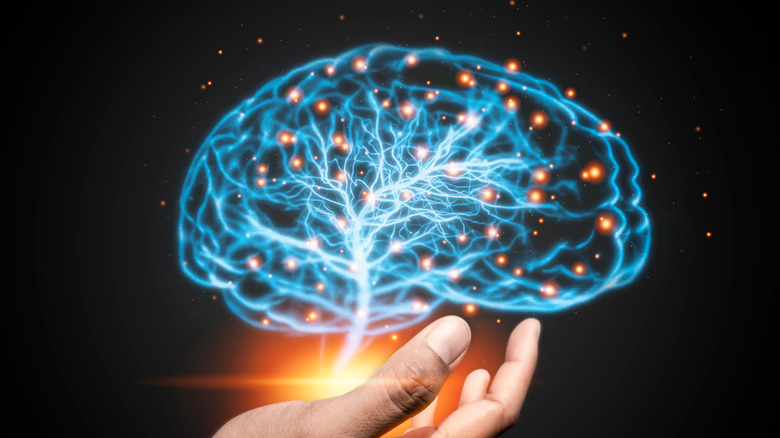How Relationships Affect Your Brain
Relationships are an integral part of our lives. They shape the brain in myriad ways (via About My Brain Institute). There have been thousands of songs penned about the drug-like effects of being in love. Being enamored by someone in the early stages of a romantic relationship is often compared to the euphoria of being "high" (via Frontiers in Psychology). Both experiences involve the brain's dopaminergic "reward system," and a spike in neurotransmitters, which is part of why they feel so good.
On the other hand, when friends form a bond or a mother nurtures her child, powerful hormones like oxytocin are released by the brain (via the Annals of the New York Academy of Sciences). This gives rise to feelings of calm, contentment, and security.
Similar to the effects of drugs, sex, love, and even social interactions can become addictive (via Philosophy, Psychiatry, & Psychology). A person may start to feel distracted and uncomfortable when they abstain from satisfying their longing for contact for a long period of time.
Hormones are released when you experience lust
A lot is happening to your body during the early stages of a romantic relationship. Of course, there are the infamous butterflies in your belly. The racing of your pulse. The sudden flushing of your cheeks. And then there are those chemical changes in your brain, which can alter your mood in various ways, note researchers (via the Indian Journal of Endocrinology and Metabolism).
In the beginning of the dating phase, you may start to develop a sexual attraction toward one another. When this happens, your hypothalamus stimulates the production of testosterone and estrogen, according to the Indian Journal of Endocrinology and Metabolism. The hypothalamus is a small gland in the center of your brain, which coordinates the endocrine system and helps to regulate different bodily processes. Testosterone and estrogen are the body's primary reproductive hormones, which are instrumental in sexuality. Testosterone is more abundant in men and estrogen is higher in women. They help to drive sexual desire and libido, increasing feelings of lust and arousal.
The "reward" neurotransmitter dopamine is also produced as testosterone and estrogen levels increase (per the Indian Journal of Endocrinology and Metabolism). These hormones and neurotransmitters interact with each other in different ways, contributing to the buzz of sexual tension and craving.
Your reward circuit is activated when you fall in love
Dopamine is another one of the cocktail of chemicals that courses through the brain when you meet someone new (via Philosophy, Psychiatry, & Psychology). This happens when you fall in love. But dopamine is also released during platonic relationships, according to research, such as when you discover a new bff (via the Annals of the New York Academy of Sciences).
Research shows that there are many overlapping neurochemical responses in the brain when people are either falling in love or becoming dependent on an addictive substance (per Philosophy, Psychiatry, & Psychology). The greatest overlap occurs in the region of the brain where dopamine is processed, as well as both oxytocin and serotonin. This may explain why romantic and sexual encounters — and even sometimes certain friendships — can feel addictive.
When a person is love-struck, their nucleus accumbens releases large amounts of dopamine (via Philosophy, Psychiatry, & Psychology). This activates the "reward circuit," also known as the ventral tegmental area — a group of neurons at the very center of the brain — creating a connection between the object of your affection and feelings of pleasure. You feel rewarded whenever you think about or come into contact with that person, as your brain remembers the pleasurable experiences associated with them, and motivates you to seek these experiences out once again.
Relationships can make you feel less stressed
Friendship can make a difference to your stress levels, say researchers (via Development and Psychopathology). Being excluded and feeling rejected has been shown to elevate our levels of cortisol — the body's natural stress hormone. Cortisol gives you energy and boosts alertness: It floods the body with glucose and increases blood circulation, preparing you for fight or flight in case of danger. However, chronically high cortisol levels can cause inflammation and wear away at your immune system.
A 2022 study found that adolescents who spent more time interacting with supportive friends had diminished cortisol responses and experienced less social distress than others when they were socially excluded (via Current Opinion in Psychology). Research has also shown that children who have a best friend present after an adverse experience have lower cortisol levels than children without a best friend (via Development and Psychopathology).
Romantic relationships may also help bring down your stress levels. A study published in the journal Stress found that single people had higher cortisol levels than married folks. The findings lend support to the growing body of evidence that stable and committed relationships can act as a buffer against high stress levels.
But they can also make you feel more stressed
Even though they feel good, romantic relationships produce chemical changes in the brain that can also make you more stressed out, according to researchers (via ScienceDaily). For instance, when you fall in love, your serotonin levels go down. Serotonin is the brain's "happy" neurotransmitter, which is responsible for regulating mood as well as behaviors like eating and sleeping (via Nutrients). Its decline might explain why people suddenly find themselves feeling restless and on edge, or eating and sleeping erratically when they start falling head over heels for someone.
Interestingly, though, falling in love may affect serotonin levels differently in men and women, according to a study published in the Journal of Psychophysiology. For men, serotonin levels appear to drop in the early days of a new romantic relationship. The female brain, on the other hand, experiences a rise in serotonin. The study also found that women with high levels of serotonin were more likely to become preoccupied by thoughts about their partner.
Research indicates that stress is a common feature of the early phase of love (via the Indian Journal of Endocrinology and Metabolism). In moderate doses, stress sparks the quest for intimacy and closeness, which ultimately helps facilitate bonding. So, you can probably blame those love-anxiety palpitations on the cascade of stress hormones pulsing through your veins.
You may experience feelings of euphoria
Most people would agree that falling in love can feel pretty euphoric. Some scientists even liken the experience to a cocaine rush (via Philosophy, Psychiatry, & Psychology). This is a big part of what makes it so addictive.
In the early-stages of a romantic relationship, the brain is flooded with catecholamines, reports a 2021 study from the International Journal of Research Publication and Reviews. This includes chemicals like dopamine and norepinephrine, which can give you a surge of energy and produce feelings of pleasure and exhilaration. They're responsible for a number of other psychological responses too, such as a racing heart, sweaty palms, and loss of appetite.
The "feel-good" sensations that often go hand-in-hand with falling in love make you want to emotionally connect with and be around the person you desire (via the International Journal of Research Publication and Reviews). But they can also trigger obsessive thoughts and make you feel anxious.
The involvement of the brain's "reward system" in love plays an important role in mating, suggest researchers (via The Journal of Comparative Neurology). This cycle means that you are more motivated to pursue one another and find a partner to reproduce with, which enhances the survival as human beings.
Falling in love impairs your judgment
While dopamine levels are known to shoot up when people fall in love, serotonin goes down (via ScienceDaily). Researchers have suggested that low serotonin levels may be what causes people to have tunnel vision as they get swept up in the initial infatuation stages of a relationship. For instance, it's common to focus your attention on the positive qualities of your partner and overlook the negative attributes. Your concentration can often become foggy and your judgment gets clouded.
"The phrase 'love is blind' is a valid notion because we tend to idealize our partner and see only things that we want to see," Pat Mumby, professor at Loyola University Chicago Stritch School of Medicine (SSOM), told ScienceDaily.
There's also less activation of the frontal cortex when you fall in love (via FEBS letters). This is a brain region that's important in the formation of judgments and executive functioning, which may provide an explanation for why people ignore red flags when they become smitten by someone.
Your fear responses are dampened
As well as a decrease in frontal cortex activation, romantic feelings cause the amygdala to become deactivated (via Frontiers in Human Neuroscience). This is an almond-shaped structure in the brain that coordinates fear responses, helping you to stay safe. For example, if the amygdala detects a threat, it makes a quick decision to kick your "fight or flight" response into gear (via Biomolecules). This cascade of events triggers the release of various stress hormones like cortisol and adrenaline, enabling you to confront or escape a potentially dangerous situation.
Deactivation of the amygdala can lead to poor decision-making and impaired emotional regulation, say researchers (via International Journal of Research Publication and Reviews). A lower fear reactivity may be another reason why you're less rational and more susceptible to bad judgments when you're falling in love. It can mean that you're less perceptive of risks in your environment (via Biochemicals).
Oxytocin helps you develop feelings of attachment
Various chemicals in the brain are responsible for the formation of a romantic bond (via Indian Journal of Endocrinology and Metabolism). Dopamine plays a key contributing role in the development and maintenance of love. And as you enter the later stages of a relationship, your brain releases oxytocin and vasopressin, which help drive attachment.
Known as the "love hormones," oxytocin and vasopressin are produced during sexual activity and orgasm, according to research (via International Journal of Research Publication and Reviews). These neuropeptides are synthesized in the hypothalamus and released from the posterior pituitary gland into the blood (via StatPearls).
Oxytocin is also released in large amounts during childbirth and breastfeeding, promoting maternal attachment (via International Journal of Research Publication and Reviews). This powerful hormone is associated with empathy and trust, and is known to induce feelings of calmness and emotional connectedness. Its presence might account for the shift toward a sense of security and comfort in a relationship as it progresses and deepens (via Indian Journal of Endocrinology and Metabolism).
Social interactions improve your mental health
As well as steering romantic and maternal attachment, oxytocin facilitates social interactions between friends, according to research published in the Annals of the New York Academy of Sciences. The hormone is secreted into the bloodstream by a gland at the base of your brain, increasing feelings of trust, closeness, and generosity. This happens when you spend time with friends and form connections with people that you relate to. The availability of oxytocin also supports the brain's production of serotonin, another feel-good hormone that helps you feel calmer and more emotionally stable (via Nutrients).
A strong set of close friends can help ward off cognitive decline and even prevent neurodegenerative diseases like dementia, say researchers (via American Journal of Public Health). Even regularly engaging in small talk with strangers has the potential to improve your well-being, per a study published in Social Psychological and Personality Science. Having an active social life naturally involves greater mental processing abilities, such as sensing, thinking, feeling, and reasoning (via International Psychogeriatrics). This helps to expand your reserve of healthy brain cells, stimulating the growth of neuronal connections.
Relationships can alter your brain activity
There's evidence that the different people in your life can change your brain waves. A 2018 study looked at 22 couples aged between 23 and 32 years who had been together for at least 12 months (via PNAS). The researchers discovered that when couples were in the same room together, their brain waves synchronized in a way that was indicative of joint attention. The greatest synchrony occurred when the couples held hands while the female partner was subjected to mild pain on her arm. It appeared that the empathetic touch of a loved one could have analgesic effects for the other.
There might be something to the idea of being on the "same wavelength" as each other. Our brain waves are more likely to synchronize with people that we like and those we spend most of our time with, suggests a 2017 study published in Current Biology. This type of brain-to-brain coupling also correlated with engagement. The researchers observed that the students' brains were more in sync with the classmates they shared their favorite classes with, and were most likely to engage in sustained bouts of joint attention with.
Relationships can help you feel less pain
Friendships may affect your pain threshold, based on the findings of a study from the journal Scientific Reports. The researchers discovered that people with large friendship circles were better able to tolerate pain than those with fewer friends. They theorized that the rewarding nature of social interactions causes the brain to produce endorphins, which serve as natural painkillers in the body. The chemical is also known to promote pleasure and satisfaction, and underlies the infamous "runner's high" that people get during long distance running (via Science Advances).
Romantic relationships may also have pain-relieving effects. In a study published in the journal PLOS One, researchers analyzed fMRI scans of individuals who had entered a new romantic relationship. They found that people who looked at images of their partners experienced less pain. Loved-up participants also had greater activity in a number of reward-processing regions of the brain, including the amygdala, nucleus accumbens, and dorsolateral prefrontal cortex, which have been shown to have analgesic benefits. Fascinatingly, the pain-reducing qualities of viewing a picture of a loved one were just as powerful as holding their partner's hand.
The brain activity between men and women
Researchers have long investigated the brain differences in men and women (via Nature). A 2020 study from the journal Science Advances found that brains of men and women respond differently to relationships and social interactions.
The researchers looked at 10,129 brains, both male and female (via Science Advances). Specifically, they examined participants' "social brain atlas," which are the neural regions involved in social behavior and social tasks. They found that these parts of the brain were affected differently by the quality, intensity, and frequency of social exchanges, depending on the participant's gender.
A number of differences were observed (via Science Advances). For example, on average, the ventromedial prefrontal cortex of male participants' who lived in socially stimulating homes was a different volume to those that resided in less social environments. Women with smaller social networks displayed neural differences in their limbic system, which is the brain region tied to behavioral and emotional responses, particularly when it comes to survival, reproduction, and nurturing of the offspring.
However, some researchers object to the idea that men and women's brains are wired differently (via Nature). In a review of the book "The Gendered Brain," Lise Eliot, professor of neuroscience, argues that "modern neuroscientists have identified no decisive, category-defining differences between the brains of men and women."
Some people experience obsessive thoughts
Infatuation can feel obsessive at times. And the reason to this may lie in your brain chemistry, say researchers (via ScienceDaily). When you're swept off your feet, your brain's mood stabilizing hormone and neurotransmitter serotonin is said to plummet, while dopamine levels rise up. Low levels of serotonin have been linked to the anxiety disorder, obsessive-compulsive disorder (OCD), according to research (via Clinical Psychopharmacology and Neuroscience). This could explain why people experience more intense, intrusive, and irrational thoughts about their partner or relationship when they fall in love.
MRI scans have also shown that the pleasure circuit of the brain is activated when people develop romantic feelings for one another, creating a high sense of reward (via ScienceDaily). This part of the brain also happens to light up when people engage in obsessive-compulsive behaviors. So, if you can't stop thinking about your crush, or suddenly find yourself bombarded by irrational thoughts about your relationship, your brain might be to blame yet again.














